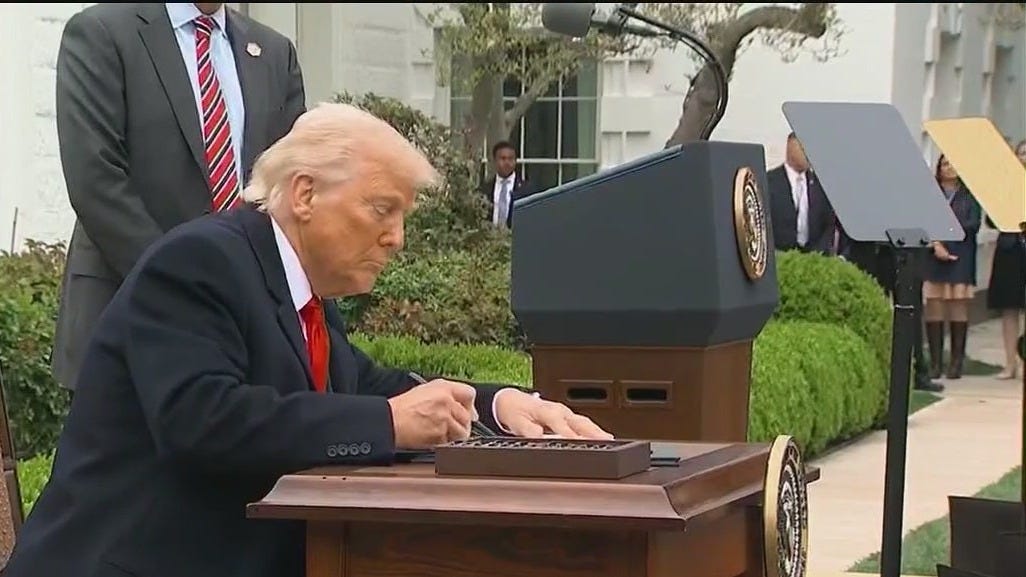Prescription drugs dodge Trump's worldwide tariff for now. What to know.

Drugmakers appeared to dodge President Donald Trump's across-the-board 10% tariff on most imported goods and higher charges for some nations.
In announcing his broad tariff plan, Trump said U.S. drugmakers will come "roaring back" with new domestic manufacturing or they will "have a big tax to pay" on imports.
But the White House released an executive order Wednesday following Trump's speech that said pharmaceuticals would be exempt from reciprocal tariffs. Other products such as copper, semiconductors, lumber, certain critical minerals, energy sources and products were also exempt, the order said.
The pharmaceutical industry isn't celebrating just yet. Trump has mused on multiple occasions that there could be trade actions for the pharmaceutical industry, which has globalized since the 1990s with a drug supply chain that stretches from Europe to India.
In one exchange with reporters in February, the president said tariffs on imported drugs would likely start around 25% and could climb higher.
The White House press office did not immediately respond to questions about the pharmaceutical industry's exemption and whether there are plans to impose a drug industry-specific tariff.
The drug industry trade group PhRMA said it shared Trump's goal of revitalizing American manufacturing.
"As the president pointed out (Wednesday), our members continue to expand their U.S. footprint, driven in part by tax policies President Trump put in place during his first term," said Alex Schriver, PhRMA's senior vice president of public affairs. "We look forward to working with the administration on ways to ensure America remains the most attractive place in the world to discover and manufacture new treatments and cures.”
Drug industry tariffs could hike prices for patients
Prior to Trump's Wednesday announcement, analysts and academics warned prescription drug prices would rise under a universal tariff for drug imports. Price hikes are more likely to surface for generic drugs and ingredients that are largely made overseas, and any increase in cost would be passed to consumers, researchers said.
The Amsterdam-based research firm ING Research said a 25% tariff on drugs and drug ingredients imported from India and Europe would trigger a 17.5% hike in generic drug prices.
The impact on patients could vary widely. For cheap generics that are widely prescribed and mass produced, such as heart medications, patients and health insurers could expect to pay about $42 more per year, ING said.
Prices for complex generic drugs made for cancer would increase even more. ING said price hikes for a six-month supply of a generic cancer drug could cost people $8,000 to $10,000 more. The price hike assumes drug suppliers and pharmacies would pass the higher costs to health insurers and patients.
Diederik Stadig, an ING senior economist, said the projected price hikes for cancer drugs assume they were made in India and shipped to the U.S.
Stadig said the typical cancer patient might not immediately get higher bills from tariff-related drug costs. Some costs might be absorbed by insurance plans, and price increases might not materialize for several months because suppliers have stockpiled drugs in anticipation of tariffs.
"A lot of people that get treated for cancer, tend to have health insurance, and that means eventually premiums will go up," Stadig said.
Billionaire entrepreneur Mark Cuban said his drug company, Cost Plus Drugs, would raise prices if Trump imposed a tariff on drugs imported from India. In a podcast interview with Tara Palmeri, Cuban said his company imports medications from India.
"We only have a 15% markup, so we can't just eat it," said Cuban. With such a low margin, Cuban said his company would be forced to pass tariff costs to consumers.
China and North America tariffs remain in place
While drug companies have ducked a worldwide tariff for now, the Trump administration's previously announced tariffs on imported goods from China, Canada and Mexico are still intact.
The Trump administration imposed a 20% levy on imports from China, which is a major supplier of generic pharmaceutical ingredients and medical supplies to the U.S. makers of generic drugs, and hospital pharmacists said financial pressure from tariffs could strain the nation's generic drug supplies.
Closer to home, the Trump administration has imposed a 25% levy on certain goods imported from Mexico and Canada.
Monday, the medical journal JAMA published a research letter that found the United States imports more than 400 medications from Canada. The research said a 25% tariff on those imported medicines would cost American consumers a collective $750 million per year.
Mina Tadrous, a University of Toronto pharmacy professor who led the study, said such tariffs could impact a range of medicines from antibiotics to mental health treatments.
"Straining this supply chain could trigger drug shortages and jeopardize patient care," Tadrous said in a news release. "We know that drugs with only one manufacturer and rapidly shifting supply chains increase the risk of shortages.”
Patient advocates said they are worried that any tariff-related costs will be difficult for Americans who already struggle to afford drugs.
Merith Basey, executive director, Patients For Affordable Drugs Now, said she worries the chaos around the tariff policies will send drug prices higher for people who can't afford to pay. She said 1 in 3 patients can't afford to pay for their prescription drugs now.
"So many Americans have limited savings," Basey said. "Even what may be perceived as a small increase over a year can be a huge amount for somebody who has a fixed income. Those costs add up."